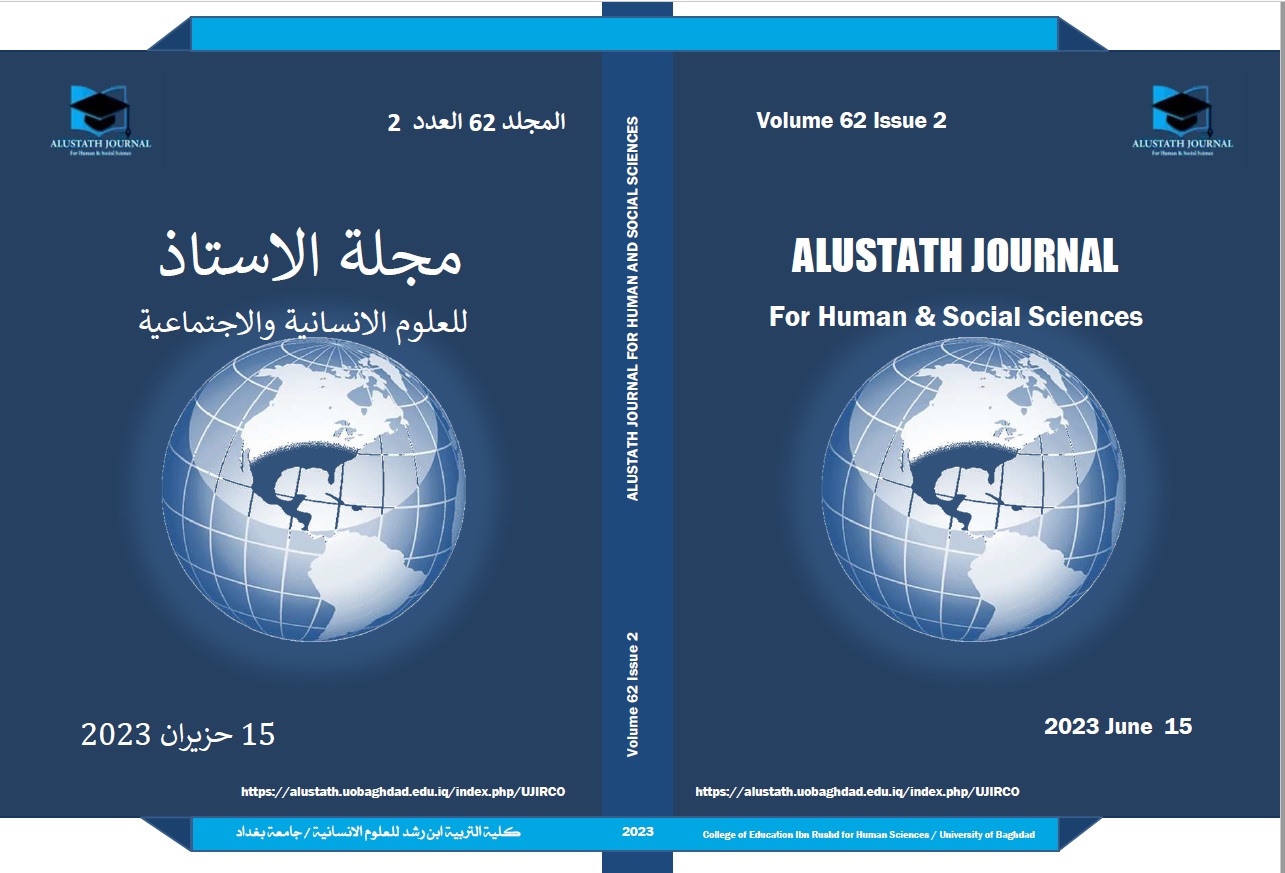مساهمة منصات التعليم عن بعد في الحد من التنمر الالكتروني من وجهة نظر معلمات المرحلة الابتدائية
DOI:
https://doi.org/10.36473/ujhss.v62i2.2020الكلمات المفتاحية:
منصات التعليم عن بعد، التنمر الإلكتروني، المرحلة الابتدائيةالملخص
هدفت الدراسة للتعرف على درجة مساهمة منصات التعليم عن بعد في الحد من التنمر الإلكتروني من وجهة نظر معلمات المرحلة الابتدائية، ولتحقيق أهداف الدراسة فقد اعتمد الباحثان المنهج الوصفي التحليلي، فيما تم استخدام الاستبانة كأداة رئيسة لجمع البيانات من عينة الدراسة والتي تكونت من (116) معلمة من معلمات المرحلة الابتدائية في منطقة عسير، تم اختيارها بطريقة عشوائية بسيطة، وقد توصلت الدراسة لعدة نتائج كان من أهمها: أن درجة مساهمة منصات التعليم عن بعد في الحد من (الاستهزاء وتشويه السمعة) من وجهة نظر معلمات المرحلة الابتدائية كان مرتفعاً، ودرجة مساهمة منصات التعليم عن بعد في الحد من (الإزعاج وانتهاك الخصوصية) من وجهة نظر معلمات المرحلة الابتدائية كان مرتفعاً جداً، وكان درجة مساهمة منصات التعليم عن بعد في الحد من (الإهانة والتهديد) من وجهة نظر معلمات المرحلة الابتدائية كان مرتفعاً، وأخيراً أشارت النتائج عدم وجود فروق دالة إحصائياً لدرجة مساهمة منصات التعليم عن بعد في الحد من التنمر الإلكتروني من وجهة نظر معلمات المرحلة الابتدائية باختلاف سنوات الخبرة. وقد أوصت الدراسة بتعليم الآباء والأطفال سبل الحماية من المخاطر التي تستهدف مستقبل الأجيال من خلال الاستعانة ببرامج الوقاية والحماية التي تتصدى للتنمر بكافة أشكاله، وتنمية الوعي لدى الطلاب بالاستخدام الآمن لوسائل التكنولوجيا الحديثة بما يضمن عدم وقوعهم ضحية التنمر.
التنزيلات
المراجع
• Abdullah, Sharihan (2021). Educational platforms as an entrance to achieving automatic democracy in Egyptian universities, Journal of Research in the Fields of Specific Education, Minia University, p. (36), 703-743.
• Abu Hilal, Yasmine (2020). Psychological needs and their relationship to cyberbullying among students of the upper basic stage in the schools of Nablus Governorate, Journal of Educational and Psychological Sciences, Gaza National Research Center, 4(5), 176-194.
• Abu Odeh, Selim (2018). Scientific study curricula and its applications, Wael House for Publishing and Distribution, Jordan.
• Ahmed, Fatima (2021). Distance education in secondary schools in light of the Corona pandemic in Sharkia Governorate, "A field study", Journal of the College of Education - Ain Shams University, 45 (1), 255-334.
• Al-Ammar, Amal (2017). Attitudes towards emerging patterns of cyberbullying and its relationship to Internet addiction in light of some demographic variables among students of applied education in the State of Kuwait, Journal of the Scientific Study in Education, p. (18), 331-336.
• Al-Anazi, Abdulaziz (2021). Cyber-bullying through the Internet and social networking: a study on a sample of secondary school students in Tabuk Governorate, Arab Studies in Education and Psychology, Arab Educators Association, p. (130), 349-376.
• Al-Falahi, Mays (2021). The degree of use of electronic educational platforms in the Kurdistan region - Iraq from the point of view of primary school teachers, unpublished master's thesis. Middle East University, Jordan.
• Al-Habashi, Verses (2017). The effect of using educational platforms to follow up homework on perceived self-efficacy and mathematics achievement for third-grade students in the middle school in Makkah Al-Mukarramah, Mathematics Education Journal, 20 (*), 25-58.
• Al-Hawari, Hayat and Al-Khamis, Al-Sayed (2021). Requirements for developing moral values among basic education students to confront the phenomenon of cyberbullying, Arab Studies in Education and Psychology, Arab Educators Association, p. (133), 353-373.
• Al-Issawi, Najm (2021). Employing automated platforms in learning and teaching in the time of Corona...Usage and influence, Iraqi University Journal Supplement, 15(2), 84-102.
• Al-Mutairi, Badr (2021). The role of using electronic educational platforms in improving the educational process for secondary school students from the point of view of teachers in the Farwaniya region in the State of Kuwait, International Academic Journal in Educational and Psychological Sciences, 2(1), 202-215.
• Al-Raqqas, Khaled (2021). Electronic bullying and its relationship to the trend towards extremism among a sample of university students, an unpublished master's thesis. King Abdulaziz University, Kingdom of Saudi Arabia.
• Al-Senussi, Hala (2019). The Roles of E-platforms and Social Networks as Participatory Communicative Learning Environments in E-Learning in the Light of the Student’s Experience, Journal of the Faculty of Education, Al-Azhar University, 181(3), 58-89.
• Al-Shahrani, Hamed and Al-Shehri, Saeed (2021). The reality of my school platform from the point of view of secondary school teachers in the Asir region, Young Researchers Journal, Sohag University, p. (11), 121-150.
• Almakanin, Hisham et al. (2018). Cyberbullying among a sample of behaviorally disturbed students in the city of Zarqa, Journal of Educational and Psychological Studies, Sultan Qaboos University, 12 (1), 179-197.
• Alwan, Imad (2016). Forms of bullying in the light of some demographic variables among adolescent students in the city of Abha, Journal of Education, Al-Azhar University, 168 (1), 439-473.
• Amara, Islam (2017). Traditional and electronic bullying among students of pre-university learning, Arab Studies in Education and Psychology, Arab Educators Association, p. (86), 513-548.
• Awad, Mounir and Helles, Musa (2015). The trend towards distance learning technology and its relationship to some variables among graduate students in universities For a Palestinian, Al-Aqsa University Journal (Humanities Series), 19 (1), 219-256.
• Ben Salem, Khadija (2020). Psychological effects of cyberbullying and proactive coping strategies: From the perspective of media and communication students at Adrar University, Journal of Studies in Humanities and Social Sciences, 3(2), 75-107.
• Brachidia, Hafida (2020). Predicting factors for cyberbullying in children and adolescents: a review of previous studies, Journal of Technology and Informatics Studies, 2020(1), 1-14.
• Darwish, Omar and El-Leithi, Ahmed (2017). The effectiveness of a cognitive/behavioral learning environment based on social preferences in developing strategies for confronting electronic disguise for secondary school students, Journal of Educational Sciences, 4(1), 197-264.
• El Gendy, Nahla et al. (2021). Electronic bullying in social networks and its relationship to adolescents' attitudes towards it, Journal of Child Studies, Ain Shams University, 24 (91), 123-129.
• El-Khouly, Mahmoud (2020). The effectiveness of selective integrative counseling in reducing the level of cyberbullying behavior among students with special needs, The Arab Journal of Disability and Gifted Sciences, p. (14), 345-392.
• Epididymis, Farhan (2020). Distance Learning Technologies, Trainee's Guide, Saudi Ministry of Education, Kingdom of Saudi Arabia.
• Extremera, N., et al.(2018). Cyberbullying Victimization, Self-Esteem and Suicidal Ideation in Adolescence: Does Emotional Intelligence Play a Buffering Role?, Front. Psychol.
• Fares, Najla, et al. (2019). The effectiveness of an electronic educational platform based on automated participatory stories for the development of cooperative organization and patriotism among students of South Valley University, Journal of Education, Sohag University, C (68), 505-605.
• Kamel, Mahmoud (2018). Electronic bullying and self-esteem among a sample of deaf and hard of hearing adolescent students (a psychometric-clinical study), an unpublished master's thesis. Tanta University, Egypt.
• Marczak, M. & Coyne, I. (2010). Cyberbullying at School: Good Practice and Legal Aspects in the United Kingdom. Australian Journal of Guidance and Counselling. 20(2), 182- 193.
• Mostafa, Noha, and Salama, Hana (2022). Family dialogue and its relationship to cyberbullying among a sample of adolescents, Journal of Research in the Fields of Specific Education, Minia University, p. (38), 65-153
• Muhammad, Thana (2019). The reality of the phenomenon of electronic disguise among secondary school students in Fayoum Governorate and ways to confront it (a field study), Fayoum University Journal of Educational and Psychological Sciences, 12(2), 181-247.
• Salem, Ghadeer (2018). Interactive educational platforms "Edomodo" and its impact on the performance level of some ballet skills, Sadat City University Journal for Physical Education and Sports, p. (29), 155-175.
• Taneja, S. (2014). MOOC Providers and their Strategies, International Journal of Computer Science and Mobile Computing, 3(5), 22- 228.
• Wilson, D. (2010). A Diary Study of Self-Esteem Social Anxiety, Interpersonal Interaction and Health Risk Behavior in College Student, Colorado State University.
• Zagloul, Burhami and Shalash, Moataz (2020). Using an educational platform to develop the concepts of knowledge economy among commercial secondary school students in light of the requirements of the twenty-first century, Journal of the Faculty of Education, Tanta University, 77(1), 331-344.
• Zayed, Intisar (2020). Electronic bullying through the electronic media and its relationship to patterns of violence among adolescents (a field study), Journal of Media Research, 55 (5), 3029-3088.












